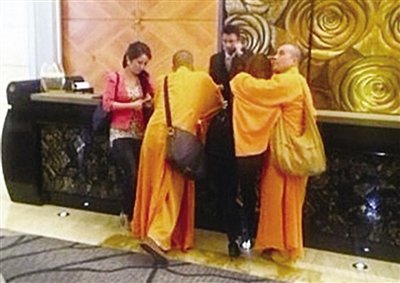It’s Friday the thirteenth (paraskevidekatriaphobics, beware) and what better way to celebrate than with an interview with “smash-and-grab Buddhist” Ian Astbury, veteran grunger and bandmember of The Cult? As the interview begins on the Huffington Post, “It might be argued that the visceral whack of The Cult’s brand of heavy, dharma-conscious rock is just the kind of Zen stick a sleepy pop culture needs administered to its backside.”
I missed the fan cult of The Cult back in the 80s, so I can’t really throw in my opinion on this. But we don’t have to take the interviewer at his word: we have YouTube! Here’s The Cult performing “She Sells Sanctuary” and perhaps whacking you with their dharma-conscious Zen music stick:
But back to the interview. After musing about Tibet, the Hunger Games, and his difficult adolescence, Astbury notes,
Being in the music business, being an entertainer or an artist, you can be raised up or you can be completely forgotten. When that door closes, all of a sudden you’re in a world of hurt. And where do you turn? You can turn to the path of self-destruction, or turn inwards. Luckily, in the ’80s, I came across Cutting Through Spiritual Materialism by Chögyam Trungpa Rinpoche. That was like dynamite in my hands, the idea that the dharma is fresh and it’s happening in this instant. It’s accessible, right now. Wow.
My ex-wife said to me, “You definitely take the hard lessons in life.” There are many ways to be hit with the stick before you get the message. It’s as though you’re a kid and you keep sticking your finger in the flame, and then you ask, “What’s this ‘getting burnt'”? There’s a message every time you get burnt, but we don’t always retain it. We forget, and we do it again. But hopefully, there’s a hunger in the spirit to really understand the lesson. In the incarnation of this life I’m going through, I think my ultimate intention is to find out, “What is the lesson in this?” And the message is, “Pay attention. Pay attention. Pay attention.”
“Pay attention” could function very well as the motto for the mindfulness movements currently being popularized all over the world. Part of the reason that these mindfulness crazes are and continue to be successful is that they have the power of science behind them. Science has told us over and over, “Mindfulness works! It really works!” But not everyone is so excited about science’s claims regarding mindfulness. This article in the Sydney Morning Herald features the cautions of Buddhist studies professor Bernard Faure that “the interpretation of research results had ‘a lot of wishful thinking,'” and that “the desire for quick results had ‘pre-empted robust critical questions.'” The article continues, “Moreover, the study sizes were unreliably small, and despite the likely relevance to the results of the culturally specific origins and meanings of the mental states under study, neuroscientists had demonstrated little attempt to understand them.” I think they’ve got a good point there, but I know as much about scientific protocol as I do about The Cult. Anyone out there with a better scientific background willing to put their two cents in?
Last—and this time, perhaps least—on Buddha Buzz, is this strange “expose” from China Daily. Keeping in mind that China Daily is a newspaper run by the Chinese government, I’m not sure what to make of this strange story of two fake Buddhist monks who were caught on camera partying, drinking, and booking hotel rooms with women. It smells fishy to me, especially in light of the news coming from the New York Times that many Tibetans have been detained for weeks in “patriotic re-education” centers after their return to Tibet from the Buddhist Kalachakra ceremonies in India. I’m not sure what the point of the story is, to be honest. But it’s worth a mention if only because it flooded my inbox this week—it’s being reblogged all over the Internet.
In any case, here’s the damning evidence:


Best of luck for the rest of your Friday the thirteenth! (And one more for the road, for luck: Time ran an article this week about Telo Tulku Rinpoche, the reincarnation of the 11th century Indian mystic Telo Rinpoche, who happened to be born in Philadelphia.)
Thank you for subscribing to Tricycle! As a nonprofit, we depend on readers like you to keep Buddhist teachings and practices widely available.